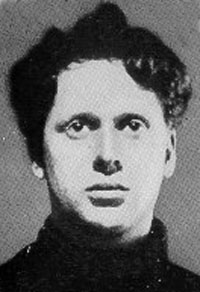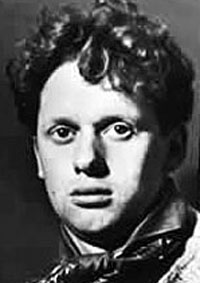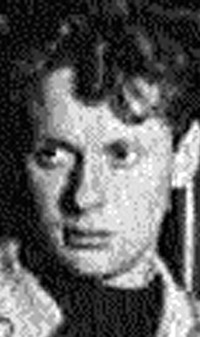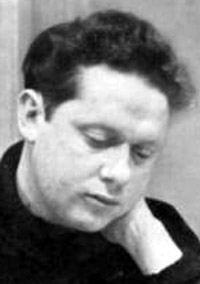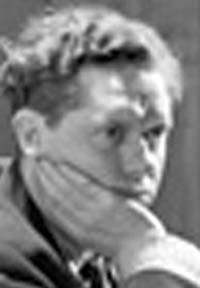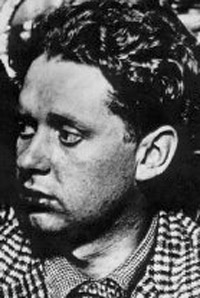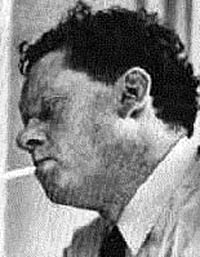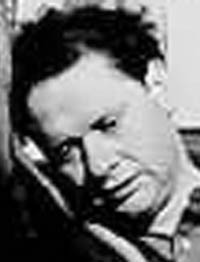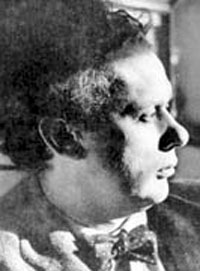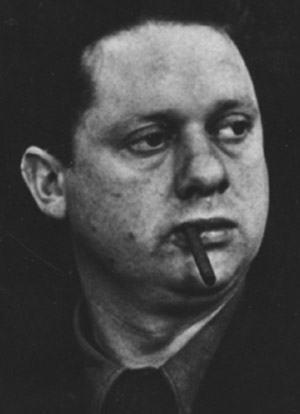Copyright Michael D. Robbins 2005
Astro-Rayological Interpretation & Charts
Quotes
Biography
Images and Physiognomic Interpretation
An alcoholic is someone you don't like who drinks as much as you do.
Don't be too harsh to these poems until they're typed. I always think typescript lends some sort of certainty: at least, if the things are bad then, they appear to be bad with conviction.
Dylan talked copiously, then stopped. 'Somebody's boring me,' he said, 'I think it's me.'
Mercury conjunct MarsGo on thinking that you don't need to be read and you'll find that it may become quite true: no one will feel the need tom read it because it is written for yourself alone; and the public won't feel any impulse to gate crash such a private party.
He who seeks rest finds boredom. He who seeks work finds rest.
I've just had eighteen straight whiskies. I think that's the record.
My education was the liberty I had to read indiscriminately and all the time, with my eyes hanging out.
The function of posterity is to look after itself.
Saturn conjunct Pluto in CancerNever be lucid, never state, if you would be regarded great.
The force that through the green fuse drives the flower. Drives my green age that blasts the roots of trees is my destroyer.
These poems, with all their crudities, doubts, and confusions, are written for the love of Man and in praise of God, and I'd be a damn' fool if they weren't.
Though lovers be lost love shall not.
Whatever talents I possess may suddenly diminish or suddenly increase. I can with ease become an ordinary fool. I may be one now. But it doesn't do to upset one's own vanity.
When one burns one's bridges, what a very nice fire it makes.
Now stamp the Lord’s Prayer on a grain of rice,
A Bible-leaved of all the written woods
Strip to this tree: a rocking alphabet,
Genesis in the root, the scarecrow word,
And one light’s language in the book of trees.
ATTRIBUTION: Dylan Thomas (1914–1953), Welsh poet. Altarwise by Owl-Light (l. 85–89). . .
The Collected Poems of Dylan Thomas, 1934-1952 (1953, rev. ed. 1956) New Directions.Do not go gentle into that good night,
Old age should burn and rave at close of day;
Rage, rage against the dying of the light.
ATTRIBUTION: Dylan Thomas (1914–1953), Welsh poet. Do Not Go Gentle into That Good Night (l. 1–3). . .
The Collected Poems of Dylan Thomas, 1934-1952 (1953, rev. ed. 1956) New Directions.The force that through the green fuse drives the flower
Drives my green age; that blasts the roots of trees
Is my destroyer.
And I am dumb to tell the crooked rose
My youth is bent by the same wintry fever.
ATTRIBUTION: Dylan Thomas (1914–1953), Welsh poet. The Force That through the Green Fuse Drives the Flower (l. 1–5). . .
The Collected Poems of Dylan Thomas, 1934-1952 (1953, rev. ed. 1956) New Directions.When logics die,
The secret of the soil grows through the eye,
And blood jumps in the sun;
Above the waste allotments the dawn halts.
ATTRIBUTION: Dylan Thomas (1914–1953), Welsh poet. Light Breaks Where No Sun Shines (l. 27–30). . .
The Collected Poems of Dylan Thomas, 1934-1952 (1953, rev. ed. 1956) New Directions.And nothing I cared, at my sky blue trades, that time allows
In all his tuneful turning so few and such morning songs
Before the children green and golden
Follow him out of grace.
ATTRIBUTION: Dylan Thomas (1914–1953), Welsh poet. Fern Hill (l. 42–45). . .
The Collected Poems of Dylan Thomas, 1934-1952 (1953, rev. ed. 1956) New Directions.And you, my father, there on the sad height,
Curse, bless, me now with your fierce tears, I pray.
Do not go gentle into that good night.
Rage, rage against the dying of the light.
ATTRIBUTION: Dylan Thomas (1914–1953), Welsh poet. Do Not Go Gentle into That Good Night (l. 16–19). . .
The Collected Poems of Dylan Thomas, 1934-1952 (1953, rev. ed. 1956) New Directions.And nightly under the simple stars
As I rode to sleep the owls were bearing the farm away,
ATTRIBUTION: Dylan Thomas (1914–1953), Welsh poet. Fern Hill (l. 23–24). . .
The Collected Poems of Dylan Thomas, 1934-1952 (1953, rev. ed. 1956) New Directions.Oh as I was young and easy in the mercy of his means,
Time held me green and dying
Though I sang in my chains like the sea.
ATTRIBUTION: Dylan Thomas (1914–1953), Welsh poet. Fern Hill (l. 52–54). . .
The Collected Poems of Dylan Thomas, 1934-1952 (1953, rev. ed. 1956) New Directions.My busy heart who shudders as she talks
Sheds the syllabic blood and drains her words.
ATTRIBUTION: Dylan Thomas (1914–1953), Welsh poet. Especially When the October Wind (l. 7–8). . .
The Collected Poems of Dylan Thomas, 1934-1952 (1953, rev. ed. 1956) New Directions.Dressed to die, the sensual strut begun,
With my red veins full of money,
In the final direction of the elementary town
I advance for as long as forever is.
ATTRIBUTION: Dylan Thomas (1914–1953), Welsh poet. Twenty-four Years (l. 6–9). . .
The Collected Poems of Dylan Thomas, 1934-1952 (1953, rev. ed. 1956) New Directions.But for the lovers, their arms
Round the griefs of the ages,
Who pay no praise or wages
Nor heed my craft or art.
ATTRIBUTION: Dylan Thomas (1914–1953), Welsh poet. In My Craft or Sullen Art (l. 17–20). . .
The Collected Poems of Dylan Thomas, 1934-1952 (1953, rev. ed. 1956) New Directions.Her fist of a face died clenched on a round pain;
And sculptured Ann is seventy years of stone.
These cloud-sopped, marble hands, this monumental
Argument of the hewn voice, gesture and psalm,
Storm me forever over her grave
ATTRIBUTION: Dylan Thomas (1914–1953), Welsh poet. After the Funeral (l. 34–38). . .
The Collected Poems of Dylan Thomas, 1934-1952 (1953, rev. ed. 1956) New Directions.In a fiercely mourning house in a crooked year.
ATTRIBUTION: Dylan Thomas (1914–1953), Welsh poet. After the Funeral (l. 30). .
The Collected Poems of Dylan Thomas, 1934-1952 (1953, rev. ed. 1956) New Directions.Though they be mad and dead as nails,
Heads of the characters hammer through daisies;
Break in the sun till the sun breaks down,
And death shall have no dominion.
ATTRIBUTION: Dylan Thomas (1914–1953), Welsh poet. And Death Shall Have No Dominion (l. 23–26). . .
The Collected Poems of Dylan Thomas, 1934-1952 (1953, rev. ed. 1956) New Directions.And I am dumb to tell the lover’s tomb
How at my sheet goes the same crooked worm.
ATTRIBUTION: Dylan Thomas (1914–1953), Welsh poet. The Force That through the Green Fuse Drives the Flower (l. 21–22). . .
The Collected Poems of Dylan Thomas, 1934-1952 (1953, rev. ed. 1956) New Directions.A candle in the thighs
Warms youth and seed and burns the seeds of age;
ATTRIBUTION: Dylan Thomas (1914–1953), Welsh poet. Light Breaks Where No Sun Shines (l. 7–8). . .
The Collected Poems of Dylan Thomas, 1934-1952 (1953, rev. ed. 1956) New Directions.This world is half the devil’s and my own,
Daft with the drug that’s smoking in a girl....
ATTRIBUTION: Dylan Thomas (1914–1953), Welsh poet. “If I were tickled by the rub of love.”
Dylan Thomas was born in the coastal city of Swansea, Wales. His father David, who was a writer and possessed a degree in English, brought his son up to speak English rather than Thomas's mother's native language, Welsh. His middle name, "Marlais", came from the bardic name of his uncle, the Unitarian minister Gwilym Marles (whose real name was William Thomas). Thomas was unable to actively fight in World War II because he was considered too frail, however he still served the war effort by writing scripts for government propaganda.
Thomas attended the boys-only Swansea Grammar School, in the Mount Pleasant district of the city, where his father taught English Literature. It was in the school's magazine that Thomas saw his first poem published. He left school at age 16 to become a reporter for a year and a half.
Thomas' childhood was spent largely in Swansea, with regular summer trips to visit his mother's family on their Carmarthen farm. These rural sojourns, and their contrast with the town life of Swansea, provided substance for much of his work, notably many short stories and radio essays and the poem Fern Hill.
Thomas wrote half his poems and many short stories when he lived at the family home at 5 Cwmdonkin Drive; And death shall have no dominion is one of the best known works written at this address. His highly acclaimed[1] first poetry volume, 18 Poems, was published in November 1934. The publication of Deaths and Entrances in 1946 was a major turning point [2][3][4] in his career, with widespread recognition that a great poet had indeed emerged. Thomas "became a very successful orator...was extremely well-known during his life for being a versatile and dynamic speaker and he was best known for his poetry readings."[5] His immensely striking and powerful voice would captivate American audiences during his speaking tours of the early 1950s. He made over two hundred broadcasts for the BBC
Marriage & childrenmet his wife Caitlin and "the love affair started in a Bloomsbury pub in the spring of 1936. A young Irish dancer called Caitlin Macnamara sat on a stool at the bar: blonde, blue-eyed and drinking gin. To the drunken Welsh poet who staggered towards her through the smokey fug of The Wheatsheaf, she appeared an angelic beauty. And when finally the poet reached her, eccentrically laying his head in her lap, he mumbled a proposal of marriage. This unorthodox first encounter between Dylan Thomas and his wife is a central part of the Bohemian mythology that surrounds the memory of one of Britain's best loved creative talents."[6]
In 1937, Thomas married MacNamara and would have three children with her, although the marriage was tempestuous. There were affairs and rumours of affairs on both sides; Caitlin had an affair with Augustus John before, and quite possibly after, she married Thomas. In January of 1939 came the birth of their first child, a boy whom they named Llewelyn (died in 2000). He was followed in March of 1943 by a daughter, Aeronwy. A second son and third child, Colm Garan, was born in July 1949.
Drink and death
Thomas liked to boast about his drinking. He was known to comment, "An alcoholic is someone you don't like who drinks as much as you do."[7] During an incident on November 3, 1953, Thomas returned to the Chelsea Hotel in New York and exclaimed "I've had 18 straight whiskies; I think this is a record."He collapsed on November 9, 1953 at the White Horse Tavern, in Greenwich Village, Manhattan after drinking heavily while on a promotional speaking tour; Thomas later died at St. Vincent's Hospital. The primary cause of his death is recorded as pneumonia, with pressure on the brain and a fatty liver given as contributing factors. His last words, according to Jack Heliker, were: "After 39 years, this is all I've done." Following his death, his body was brought back to Wales for burial in the village churchyard at Laugharne. His wife, Caitlin, died in 1994, and was buried alongside him.
Poetry
On whom Thomas writes for: see "In My Craft Or Sullen Art:"[8]Not for the proud man apart
From the raging moon I write
On these spindrift pages
Nor for the towering dead
With their nightingales and psalms
But for the lovers, their arms
Round the griefs of the ages
Who pay no praise or wages
Nor heed my craft or art.Here is an exemplary excerpt, from "In the White Giant's Thigh:"
Who once were a bloom of wayside brides in the hawed house and heard the lewd wooed field flow to the coming frost the scurrying furred small friars squeal in the dowse of day in the thistle aisle till the white owl crossed..."[9]
Perhaps no other poem depicts so clearly the innate spirituality, the romantic and the metaphysical nature of Thomas as a poet than And Death Shall Have no Dominion, for it is especially in this poem that he expresses his wide and deep love of humanity and the immortalist sentiment that death shall never triumph over life. For example, the lines:
And death shall have no dominion
Dead men naked they shall be one
With the man in the wind and the west moon
When their bones are picked clean and the clean bones gone
They shall have stars at elbow and foot
Though they go mad they shall be sane
Though they sink through the sea they shall rise again
Though lovers be lost love shall not
And death shall have no dominion.And also in the second verse: Faith in their hands shall snap in two, And the unicorn evils run them through; Split all ends up they shan't crack; And death shall have no dominion.[10]
Thomas memorials
See also: Cultural depictions of Dylan Thomas
As would be expected of a famous poet whose best known line is "Do not go gentle into that good night", many memorials have been constructed or converted to honour Thomas. Tourists in his home town of Swansea can visit a statue in the maritime quarter, the Dylan Thomas Theatre, and the Dylan Thomas Centre, formerly the town's guildhall. The latter is now a literature centre, where exhibitions and lectures are held and is the setting for the city's annual Dylan Thomas Festival. Another monument to Thomas stands in Cwmdonkin Park, one of his favourite childhood haunts, close to his birthplace at 5 Cwmdonkin Drive. The memorial is inscribed with the closing lines from one of his best-loved poems, Fern Hill: "Oh as I was young and easy in the mercy of his means/Time held me green and dying/Though I sang in my chains like the sea."[11] This is inscribed on a rock in a closed-off garden within the park. Thomas's home in Laugharne, the Boat House, is also a memorial. The Powerful Coolmore Stud have a Colt (horse) called Dylan Thomas which won the Irish Derby on the 2nd July 2006.Several of the pubs in Swansea also have associations with the poet. One of Swansea's oldest pubs, the No Sign Bar, was a regular haunt, renamed the Wine Vaults in his story The Followers.
In 2004 a new literary prize, the Dylan Thomas Prize,[12] was created in honour of the poet. It is awarded to the best published writer in English under the age of 30.
His obituary was written by his long term friend Vernon Watkins.
A class 153 locomotive was named Dylan Thomas 1914 - 1953.
A song by a Welsh rock band, The Rambones, pays tribute to Thomas in the final line, as they sing, "I choose to go gentle, but I promise/It's with no offense to Dylan Thomas."
The cover of the Beatles album Sgt. Pepper's Lonely Hearts Club Band contains a photograph of Dylan Thomas.
Robert Zimmerman borrowed Dylan Thomas' first name in creating his pseudonym, Bob Dylan
Alternative rock band The Slip make a reference to the poet in their 2006 song, "Airplane/Primitive" from the album Eisenhower : "It is the day before the rest of my life / And I feel like Dylan Thomas".
The Doctor and the Devils (1964)
Discography: Volume I - A Child's Christmas in Wales and Five Poems (Caedmon TC 1002 - 1952)
Under Milk Wood (Caedmon TC 2005 - 1953) : Volume II - Selections from the Writings of Dylan Thomas (Caedmon TC 1018 - 1954) : Volume III - Selections from the Writings of Dylan Thomas (Caedmon TC 1043) : Volume IV - Selections from the Writings of Dylan Thomas (Caedmon TC 1061) : Quite early one morning and other memories (Caedmon TC 1132 - 1960)(1914-1953)
Welsh poet and prose writer whose works are known for musical quality of the language, comic or visionary scenes and sensual iimages. Dylan Thomas died in the United States on a tour on November 9, 1953. His death resulted much from his alcoholism, which have gained mythic proportions. The Dylan Thomas Centre in Swansea even serves pints of Dylan's smooth ale. It has been claimed that the famous American famous songwriter and musician Bob Dylan, who was born Robert Allen Zimmerman, named himself after the Welsh poet, but Dylan himself had denied it.
"The hand that signet the paper felled a city;
Five sovereign fingers taxed the breath,
Doubled the globe of dead and halved a country;
These five kings did a king to death."
(from 'The Hand That Signed the Paper', 1936) was born in the seaport town Swansea, West Glamorgan. His father, David John Thomas, was the senior English master at Swansea Grammar School, where Thomas was educated. His parents had a Welsh-speaking country background from Carmarthhenshire, but they adopted English language and culture. Although Thomas could not speak Welsh, he picked up the rhytms of the language, and started to write poetry while still at school.Thomas received little formal education. When he was twelve, his poem was published in the Western Mail. Actually the work was copied from the Boy's Own Paper. Other verse, original without any doubts, he wrote for the Grammar School magazine. Ignoring his father's advice to attend university, he left his studies and worked as a trainee newspaper reporter on the South Wales Evening Post. His first book, dreamlike and sensuous 18 POEMS (1934), marked the appearance of an energetic new voice in English literature. Thomas wrote the poems when he was nineteen and twenty years old. In 'I see the boys of summer' Thomas identifies himself with doomed Welshmen, victims of time. "Awake, my sleepers, to the sun, / A worker in the morning town, / And leave the poppied pickthank where he lies; / The fences of the light are down, / All but the briskest riders thrown, / And worlds hang on the trees." The collection was followed by TWENTY-FIVE POEMS (1936), which established his reputation. Thomas moved to London where he worked as a broadcaster, prose writer, poet, and lecturer. With the writer Pamela Hansford Johnson, he started correspondence and a love affair. "Charming, very young looking with the most enchanting voice," she wrote in her diary when they met. Later she married Lord (C.P.) Snow. In 1937 Thomas married Caitlin Macnamara, whom he called in a letter "Betty Boop". For a while the couple settled at Laugharne in Wales, returning there permanently after many wanderings in 1949. The marriage was stormy; Thomas was a natural bohemian and eventually Caitlin became tired in her husband's frecklessness. Thomas's earnings were irregular, his earnings just melted away, and he had to borrow money from his friends.
By the end of the 1930s, Thomas had gained fame in the literary circles, but he also suffered from depression and was afraid of losing inspiration. He became later a highly public figure due to his radio work and readings. His romantic, rhetorical style won a large following. Some writers, among them Philip Larkin, rejected his work as too subjective.
Unfit for active service, Thomas worked during World War II as a documentary film script writer. With Alan Osbiston he directed the documentary These Are The Men (1943), an attack on the Nazi leaders, which used shots from Leni Riefenstahl's The Triumph of the Will (1935). Sporadically Thomas was employed by the BBC, where his striking, melodic voice made him a media star. After the German planes had firebombed London, Thomas composed the lines: "Deep with the first dead lies London's daughter, Robed in the long friends, / The grains beyond age, the dark veins of her mother, / Of the riding Thames. / After the first death, there is no other." (from 'A Refusal to Mourn the Death, by Fire, of a Child in London', 1946) In the 1940s Thomas wrote some of his best works. PORTRAIT OF AN ARTIST AS A YOUNG DOG (1940) was a collection of largely autobiographical short stories, paying homage to James Joyce. DEATHS AND ENTRANCES (1946) used religious imagery and took its subjects among others from the bombing of London, or from the loss of childhood world as in the poem 'Fern Hill'. Another pastoral ode, 'Poems in October,' expressed Thomas's nostalgia for lost youth.
In 1947, when Thomas contributed to more than 50 features for the BBC, he suffered a mental breakdown, and moved to Oxford. He returned to Wales in 1949 and made his first American tour next year, mostly because of financial pressures. In 1950, 1952, and 1953 Thomas continued his popular reading tours on American college campuses, managing to hide that he did not like reading his own work, but unable to resist the temptation to live up to his own reputation for being wild and drunken. Before a reading at Pomona College, Claremont, he lost his books and notes. In New York, he spent a lot of time at the Chelsea Hotel Bar. The tours were financially profitable and he met such celebrities as Greta Garbo, Marilyn Monroe, and Charlie Chaplin. At Chaplin's, he was seen urinating on a plant. Thomas died at St. Vincent's Hospital, after spending four days in a coma. According to a story, he had boasted to his American girlfriend, Liz Reitell, that he had drunk 18 straight whiskies in a bar in Manhattan. At the hospital a doctor had given him various drugs and an injection of morphine. In spite of Thomas's heavy drinking, the autopsy revealed that he did not suffer from serious cirrhosis of the liver. Caitlin Macnamara Thomas died in 1994.
His last four years Thomas spent at the Boat House in Laugharne, where he later was buried. The cottage was purchased for the family by Margaret Taylor, the wife of the historian A.J.P. Taylor. Shortly before his death in New York, Thomas took part in a reading of what was to be his most famous single work. UNDER MILK WOOD (1954) was a return to the Welsh landscape, and a celebration of domestic life and dreams of ordinary people. It was published posthumously as his reminiscence A CHILD'S CHRISTMAS IN WALES (1955). His NOTEBOOKS appeared in 1968. A new edition of THE POEMS OF DYLAN THOMAS (1971) included personal comments by his friend and early collaborator, the composer Daniel Jones. The musician John Cale has set several of Thomas's poems to music. "As to the Thomas heritage industry: ouch!" Cale has said.
Thomas's poetry is marked by vivid metaphors, the use of Christian and Freudian imagery, and celebration of the mystical power of growth and death. "My poetry," Thomas once said, "is the record of my individual struggle from darkness toward some measure of light." Although Thomas's poems appear to be freely flowing, his work sheets reveal much work behind his mixture of the vernacular and literary. To Pamela Hansford Johnson he once said in the 1930s, that he wrote at the rate of two lines an hour. Among his best-known individual poems are 'And death shall have no dominion,' 'Altarwise by owllight' (a sonnet sequence), 'A Refusal to Mourn the Death, by Fire, of a Child in London,' 'Do not go gentle into that good night,' 'In My Craft and Sullen Art,' and 'Fern Hill.' His own role and gift as a poet Thomas paralleled with the forces of nature: "Oh as I was young and easy in the mercy of his means, / time held me green and dying / though I sang in my chains like the sea." (from 'Fern Hill')
Thomas also wrote short stories, essays, and a roman à clef, ADVENTURES IN THE SKIN TRADE (1955), which was left unfinished. Thomas's radio play Under the Milk Wood portrayed a small Welsh coastal town and was made in 1971 into a film starring Richard Burton and Elizabet Taylor. His own film scripts concerned less personal subjects. No Room at the Inn (1948), directed by Daniel Birt and scripted by Thomas and Ivan Foxwell, was adapted from a stage play by Joan Temple. THE DOCTOR AND THE DEVILS (1953), set in the late eighteenth century Edinburgh, examined the theme of 'the ends justify the means'. It was based on the case of the murderers Burke and Hare. In the story a surgeon starts to pay for bodies, which he uses as cadavers for dissection. The trial also touched foundations of the whole society: "SECOND PROFESSOR: ... and if a member of the royal family is accused of a commoner's crime, then it is the whole family that is accused. An elaborate smile - but you see my point?"
